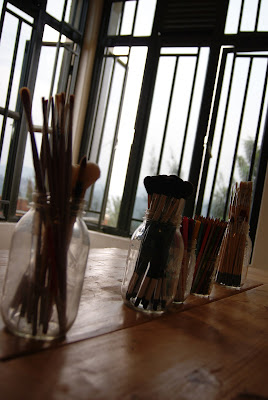A jumbled sprawl of city along the crashing waves of the
ocean, Havana is like a city at once lost and found. It is old and new,
crumbling and reconstructed, colonial and Western, dilapidated and grand.
The only billboards or advertisements sell not products, but
ideas -- a revolutionary quote here, a catchphrase touting the benefits of
socialism there. Lacking are the chain restaurants of the West, the Coca-Cola
placards rampant worldwide. The only advertisements to be seen are quarantined
to the airport, pushing big brand rum and cigars on arrival.
In touristic Havana Vieja, fresh coats of paint cover
colonial buildings, souvenir stands sell bags and shirts covered in iconic
images of Che Guavara, and ritzy hotels and restaurants sprout like mushrooms.
Tourists in shorts and large floppy hats watch street musicians blaring
Afro-Cuban jazz. Iconic cars and bicycle rickshaws roll by.
Blocks away in Havana Centro, buildings crumble in various
states of rundown disrepair like some post-apocalyptic version of 1950s
Americana. Art deco buildings, neon signs, and beat-up antique cars line major
streets, while narrow one-ways are full of life. Women in bright spandex
cluster on stoops and sidewalks and stray dogs roam. Men chat and smoke while elderly
folks gossip through window and door grates. Young boys play makeshift games of
football and tiny restaurants sell peso pizza to go.
Much like the duality of shiny tourist Havana and real life
Havana, Cuba’s dual economy provides for harsh disparities. In an attempt to
allow for tourism and still maintain a communist system, tourists spend one
currency, locals another. The tourist dollar, or CUC, worth 25 pesos, is just
as widely jostled for and fought over as in any tourism center. It’s a slow
permeation of capitalism, a steady leak that will almost assuredly increase
with the loosening of American barriers to tourism and business in Cuba.
But to see it now, with regulations and relations in limbo,
before that creeping change that will inevitably happen, was quite fortuitously
timed. To see it while it is still a country that requires unplugging and
disconnecting from the endless internet obsession. To see it while the classic American cars are
part of daily life and not just a remnant maintained like museum pieces. To see
it while the tourist throngs are still relatively small. What splendid timing.





















































